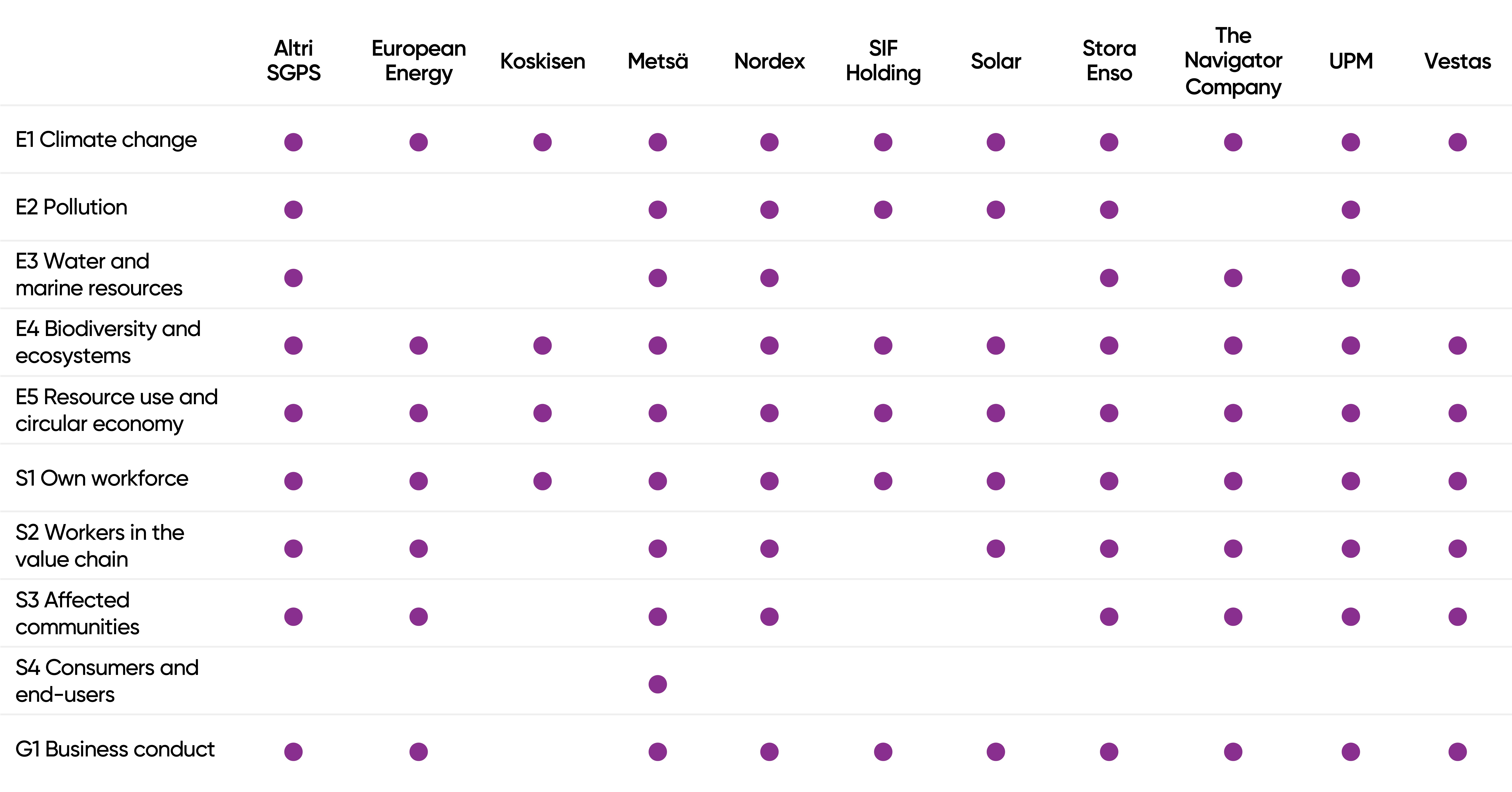How the renewable energy sector is applying double materiality assessments
The EU’s legally binding target to source 42.5% of its energy from renewables by 2030 is rapidly growing the sector’s role in the global energy mix. Double materiality assessments (DMA) are crucial for supporting the energy transition by improving comparability, strengthening stakeholder trust and aligning business operations with sustainability reporting requirements.
Though the renewable resource sector has an inherently sustainable reputation, companies must ensure that their operations similarly reflect sustainable choices. The Corporate Sustainability Reporting Directive (CSRD) facilitates this by requiring companies to disclose their sustainability-related impacts using a DMA.
To assess the sector’s response to the CSRD, we reviewed 11 sustainability statements published in 2025 by renewable resources and alternative energy companies: Altri SGPS, European Energy, Koskisen, Metsä, Nordex, SIF Holding, Solar, Stora Enso, The Navigator Company, UPM and Vestas.
Assessment
Four out of the ten topics under the European Sustainability Reporting Standards (ESRS) were identified as material by all companies. However, differences between sub-sectors — including pulp and paper production, wind technology, solar technology and forestry management — led to varying emphasis on other ESRS topics, as seen below.

Strong environmental focus
As expected, environmental factors are highly prioritised. All companies report on climate change, focusing on climate change mitigation, adaptation and energy. Similarly, biodiversity is widely included as direct impacts of pulp and paper and forestry management companies due to direct land use. Circular economy is also a common focus, with both resource inflows of raw material usage and outflows of waste reported.
In contrast, pollution and water show more variability. Four out of 11 companies consider pollution non-material due to incomplete value chain data and its low perceived impact and relevance to the business and its stakeholders. Five out of 11 companies do not consider water a material topic. While water is more important to pulp and paper companies due to processing needs, solar and wind companies focus more on land use.
Growing attention to social standards
Under the social factor, topics such as own workforce, workers in the value chain and affected communities are consistently material. Companies frequently report on their own workforce's working conditions, health and safety, and diversity. Likewise, impacts on workers in the value chain are addressed by nearly all companies, focusing on supply chain transparency and human rights issues.
The topic of affected communities appears most consistently in pulp and paper production companies, which disclose operational impacts on indigenous rights and land use conflicts. Though less frequently, wind technology companies also consider impacts on indigenous communities, reporting both positive – in creating new jobs and promoting local development – and negative impacts – in land and water grabs and violation of workers’ rights. This focus on social standards is critical, as the EU renewable energy objectives require land of up to 445,654 km2 by 2050, predominantly located in rural areas.
Governance and ethics
Regardless of specific sub-sector activities, business conduct is a baseline expectation for nearly all companies. Reports mainly cover anti-corruption, whistleblower protections and ethical culture. While most companies disclose a commitment to ethical practices, the depth of this disclosure varies significantly. Some provide detailed accounts of their governance systems, including third-party verification and staff training programs, while others offer more limited descriptions with general policies and statements.
Inconsistencies
Koskisen is the only company that considers business conduct a non-material topic, stating that ethical business practice is already integrated into its day-to-day operations. Their assessment did not look at specific factors like location, sector or transaction types in relation to unethical practices like corruption or supplier treatment. This omission from material disclosures could limit stakeholders’ ability to evaluate how well these principles are carried out across diverse operational contexts.
Metsä also stands out as the only company that deems end-users a material topic, discussing the potential for information-related impacts on consumers’ access to quality information. Given the renewable resources sector’s business-to-business (B2B) function, most companies consider end-user concerns as outside their direct responsibility. However, Metsä’s inclusion highlights that information transparency remains a relevant topic, especially as expectations around ethical communication and product knowledge continue to grow.
Comparability
DMAs are becoming increasingly important as we move towards the 2030 renewable energy target. A breakdown of material topics commonly reported in the renewable resources sector highlights considerable diversity of material topics, especially across sub-sectors.
While environmental topics like climate change and circular economy remain central, growing attention to social and governance issues reflects the broader scope of sustainability expectations. As more companies adopt standardised double materiality frameworks, stakeholder confidence in sustainability disclosures can grow.
Sources:
- European Commission: "Renewable energy targets"
- Frontiers in Environmental Science journal: "Land use and Europe’s renewable energy transition: identifying low-conflict areas for wind and solar development"
Get comfortable, there’s more
If you enjoyed this article, there's plenty more media to get your mind into.
Sign up to our newsletter
and we'll report back to you with industry news and updates you'll actually want to know.





